CCF Tea is your new digestive SOS. This Ayurvedic tea blend is an antidote to over-eating, and a sore, distended belly.
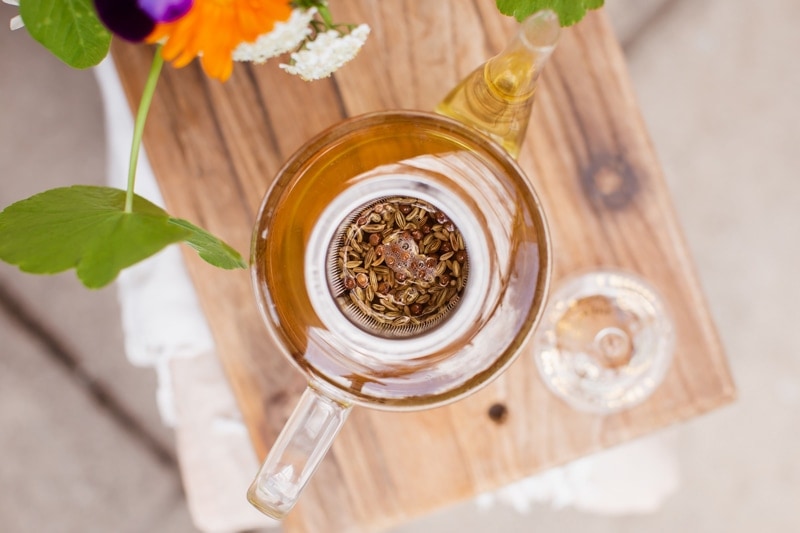
How wonderful to have a medicine chest in your own spice rack! As someone with a history of digestive disorders, I can't recall the number of times teas (steeped long and strong), have helped bring relief when things have been nothing short of dire.
The herbs that always have a home on my shelves include kawakawa (a New Zealand native), chamomile, calendula, lemon balm, ginger and peppermint. Today's recipe is a little different in that it uses whole spices. The spice cabinet is such an untapped resource... so without further ado, please meet our friend CCF tea.
CCF tea stands for cumin, coriander and fennel tea.
It’s a traditional Ayurvedic tea blend designed to soothe digestive distress and promote a very gentle detoxification.
[bctt tweet="CCF Tea - the Ayurvedic digestive soother your belly will love. Recipe here." username="laurenglucina"]
Ayurvedic CCF Tea – for everyone
The beauty of this tea is that it is well suited to all constitutions, which is why I’ve decided to share it now, just before Christmas – make a brew after your big family meal to comfort all tummies!
In Ayurveda, there are three constitutional types – Vata, Pitta and Kapha, collectively known as the three doshas.
To simplify the typical qualities of each;
- Vata: cool, dry, light, irregular, rough, moving, changeable
- Pitta: hot, sharp, acidic, light, intense, penetrating
- Kapha: cold, damp, oily, slow, heavy, solid, soft, steady
If you don’t know what your dosha is, then complete this quiz to find out. We are all a combination, in varying degrees.
Doshic states can become imbalanced sometimes, for example, a Vata person may become imbalanced from consuming too many cold foods like ice cream, a Pitta person may be aggravated with excess salty or spicy foods, and a Kapha may be affected by excessive rich, heavy, oily foods.
The spices in this tea blend are sweet, salty, pungent, and bitter in taste – which have corresponding moistening, drying, hot and cool energetics – collectively having the net effect of being balancing to each of the three doshas. Isn’t that cool?! A one-stop shop for all!
- Cumin: salty, pungent > hot > pacifies Vata and Kapha
- Coriander: bitter > dry, cooling > decreases Pitta (balances the heat from cumin)
- Fennel: sweet > moistening, cooling > decreases Pitta (balances the heat from cumin)

Benefits of drinking CCF tea
Drinking cumin, coriander and fennel tea has some wonderful digestive benefits. All three spices are well-regarded as carminatives and digestive stimulants.
In Ayurvedic medicine, this trio are used to gently stoke your digestive fire, referred to as agni, though without being so stimulating that one overheats. When the digestive fire is healthy, the body is able to absorb and utilise the nutrients from food better, and effectively break down ama, or accumulated toxins.
CCF Tea can...
- Relieve bloating
- Reduce flatulence (phew!)
- Calm spasms in the gut
- Ease abdominal pain
- Stimulate the appetite
- Ease nausea and vomiting
Additionally, this trio of spices have wider-reaching benefits, beyond the digestive system.
The spices in CCF Tea can…
- Promote the flow of breast milk in nursing mothers. Further – cumin is a source of iron, a mineral in high demand during lactation
- Be used topically to treat conjunctivitis
- Soothe menstrual cramps
- Support respiratory health (by relaxing the bronchioles and opening up the airways - note - best used as the essential oils rather than whole spices here)
- Help balance blood glucose
- Stimulate lymphatic flow
- Modulate inflammation
- Promote mental clarity
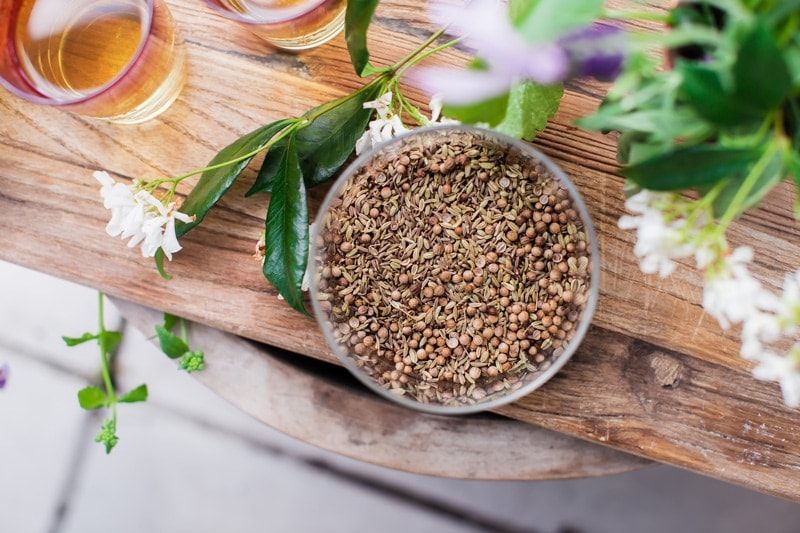
How to Make CCF Tea
The simplest of recipes: combine equal parts organic cumin, coriander and fennel seeds, and store in a glass jar.
To serve, add 1 rounded teaspoon per person to your tea pot, let it steep in boiling water for at least 5 minutes, then pour and enjoy.
What does it taste like?
I know – I was a bit hesitant at the thought of drinking cumin seeds of all things… but, I can assure you, you’ll be pleasantly surprised. It might just be your new go-to digestive tea!
Enjoy!

More Ayurvedic Inspired Recipes...
A few of my personal favourites you might love;
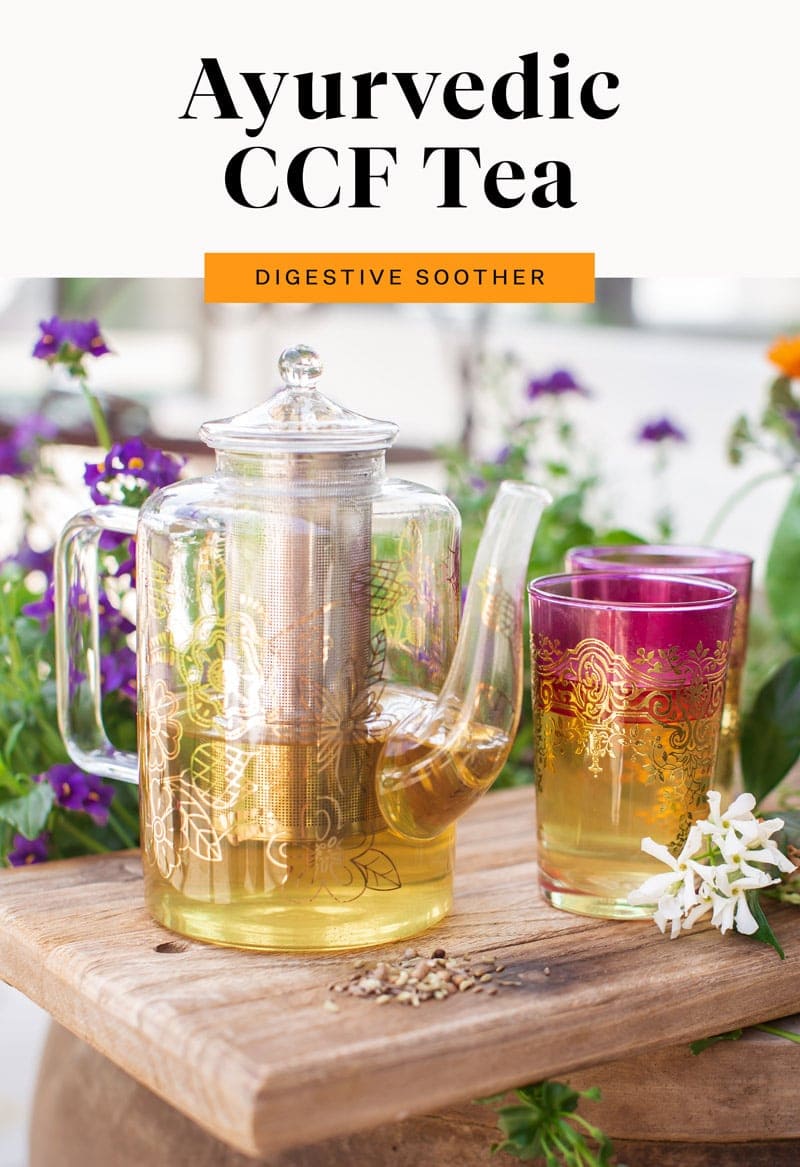
If you make and enjoy this recipe, please leave a rating below. And better yet – leave me a comment to tell me how you got on, or just say hi – I LOVE hearing from you. Follow me on Instagram, Facebook or Pinterest to see more of my everyday recipes and wellness tips.
If you’d like to chat with me about essential oils, or book in a class, you can do that here. If you’re after a Naturopathic consult, read more here.
📖Recipe

CCF Tea Recipe
Equipment
- Glass jar for storage
- Tea pot with strainer
Ingredients
Tea blend:
- 30 g organic cumin seeds (1oz)
- 30 g organic coriander seeds (1oz)
- 30 g organic fennel seeds (1oz)
To serve:
- 1 rounded teaspoon CCF tea blend
- 1 cup boiling water
Instructions
Tea Blend:
- Combine all ingredients and transfer to a glass jar.
To Serve:
- Add one rounded teaspoon of your CCF tea blend to a teapot, with 1 cup boiling water.
- Let steep for at least 5 minutes, then pour and enjoy.
Notes
- Choose the freshest spices you can find, to ensure their therapeutic potency
- If you prefer a slightly sweeter taste, increase the proportion of fennel
- No need to serve with milk
- The longer you steep, the more potent the tea!
- Enjoy as a digestive soother for over-eating, wind and bloating
- Serve chilled if you're in warmer weather
Nutrition


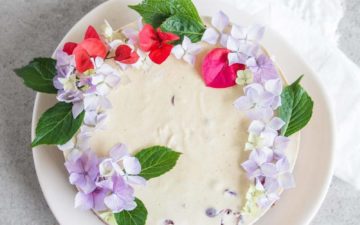

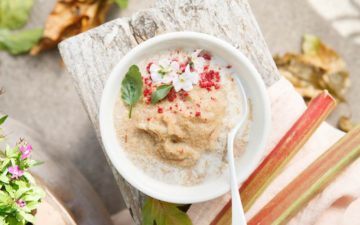
Lexi Haslett
Hi! I was wondering if you could substitute the actual herbs for essential oils and put it in a capsule daily?
Lauren Glucina • Naturopath, Nutritionist
Hi Lexi, not recommended as essential oils may be harmful to the microbiome taken like this. They may also compromise kidney health. Whole herb is the way to go.